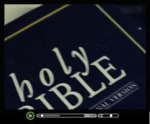King James Bible
King James Bible - The History
The King James Bible, published in 1611, was England's authorized version of the Bible translated from the original Hebrew and Greek languages into English at the request of King James I of England. At the time, other English Bibles existed, but King James did not like the most popular translation, the Geneva Bible, because he felt that some of the marginal notes encouraged disobedience to kings. So when a Puritan scholar, Dr. John Reynolds, suggested a new English translation of the Bible at a 1604 conference of bishops and theologians at Hampton Court Palace, King James readily agreed. By June of 1604, fifty-four of England's foremost scholars and linguists were formed into six panels to translate particular groups of Old Testament and New Testament books and the Aprocrypha (the Aprocrypha was dropped from later editions) into English. Even though King James agreed to the new Bible translation, and the translators dedicated their work "to the most high and mighty prince James," the King James Version was never officially recognized by the king, nor was it ever authorized as the only text permitted to be read in church. Despite this, it soon replaced both the Bishops' Bible and the Geneva Bible in popularity and became the leading text for private use.
King James Bible - The Translators
Of the original 54 men chosen to translate the King James Bible, only 47 finished the more than seven-year project, which was governed by very strict rules of translation. The translators were scholarly men who were experts in the biblical languages, and they were convinced of the inerrancy and authority of Scripture. Dr. Henry M. Morris, President of the Institute for Creation Research, said of these men, "It is almost certain that no group of Bible scholars before or since has ever been as thoroughly fit for their task as was the King James Translation Team."
The planning of the translation project stipulated that the translators should be broken up into six panels, and each panel was given certain books of the Bible to translate. After the translations were done, a committee of 12-two translators from each of the six panels-reviewed the work based on a detailed set of guidelines that was established to ensure that the translators' personal eccentricities and political prejudices were not included in this new version.
King James Bible - The Purpose
The King James Bible was developed to be read out loud at church services, so in light of this, the translators gave diligent attention to rhythm and punctuation to give the text a fresh oral quality that no other translations to date could match. These men were so dedicated to their task of translating the Bible into the common language of the people that they included the following in the Bible's preface entitled, "The Translators to the Reader:"
-
Translation it is that openeth the window, to let in the light; that breaketh the shell, that we may eat the kernel; that putteth aside the curtain, that we may look into the most Holy place; that removeth the cover of the well, that we may come by the water, even as Jacob rolled away the stone from the mouth of the well, by which means the flocks of Laban were watered.
King James Bible - Comparison to the Original Manuscripts
The King James Version translation effort was based primarily on the Bishops' Bible, but the translators also used the Tyndale, Matthew, Coverdale, Great, and Geneva Bibles; and because many of the translators were skilled in both Hebrew and Greek, they could also refer to the Masoretic text (Hebrew Old Testament) and the Septuagint (Greek translation of Hebrew Scriptures) during their work. If all of the Bibles listed here were traced back to their origins (a work beyond the scope of this writing) the path would lead directly back to the original Hebrew and Greek manuscripts of the Old and New Testaments that exist today.
Because its translators strove for accuracy, beauty, power, and literal faithfulness to the Greek and Hebrew texts, the King James Bible has endured as one of the most beloved translations for centuries. In fact, it was unrivaled in its first 250 years. In 1881, 50 scholars developed the English Revised Version, and they had this to say about the King James Version:
-
We have had to study this great Version carefully and minutely, line by line; and the longer we have been engaged upon it the more we have learned to admire its simplicity, its dignity, its power, its happy turns of expression, its general accuracy, and, we must not fail to add, the music of its cadences, and the felicities of its rhythm.
What is your response?



